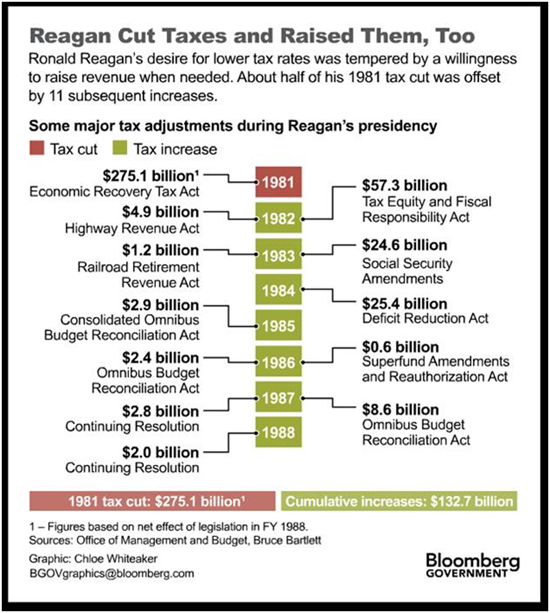This week I stumbled on the figure below regarding Reagan's tax record at around the same time we got the TPC score of the Cain 9-9-9 tax plan.
The party may revere Reagan, but they definitely wouldn't recognize each other if they met at a tax policy conference today. Nor would the gipper last for long on the Republicans side of the deficit-reduction super committee. Recall from work done by my CBPP colleague Kathy Ruffing that 82% of the savings in the 1984 Deficit Reduction Act came from revenues.
(I realize I'm straying into a space that the former Reagan official Bruce Bartlett covers extremely well, by the way.)
Anyway, with the caveat that I'm no psychotherapist, let me offer a few new categories from the fiscal DSM-IV:
- Hyper-Inequality Syndrome: The average level of income inequality (percent going to top 1%) from 1980-89 was 12.6%; from 2000-08 it was 20.3%. That's an increase in over $600 billion to the richest households (using most recent Piketty/Saez inequality data).
As I noted yesterday re the Koch brothers support of Herman Cain, these investors expect to get something for their money, and we should thus see a positive correlation between income concentration and regressive tax proposals. Which we do.
- YOYO Syndrome: Conservative economics is increasing YOYO (You're On Your Own) economics. Privatize, voucherize, disinvest in the public sector, and shrink government all under the rubric that private markets are more efficient, self-regulate, do not fail, and generate better outcomes in this the best of all possible worlds. In practice, YOYO'ism has delivered a large shift in the locus of economic risk from government and firms to households.
But in theory, in YOYO world, you need to keep all your money for yourself. Note, however, that this doesn't explain the increase in taxes on the bottom 84% in the Cain plan. I'm not saying I miss Reaganomics... I don't. But he wouldn't have gone there.
- Groveritis: If there were people running around during the Carter, Reagan, and Bush 1 years trying to extract Norquistian pledges to never raise taxes, I didn't run into them. But I suspect they were there -- just nobody felt compelled to listen to them. Again, what changed? Perhaps this:
- Government Is the Problem: This, of course, started rhetorically with Reagan himself, but it has gone viral in the worst way. There are two reinforcing dynamics here with regard to taxes. First, as middle-class and low-income family incomes have declined in real terms, the idea of sending money that you need to make ends meet to politicians to spend on their boondoggles is... um... distasteful.
And then there's this: if you are of the party that believes that government is the problem and want to make that point abundantly clear to all, then, when you are in power, you will do your best to prove that government is the problem. For example, you might waste valuable months fighting about the debt ceiling and threatening default, at a time when most Americans want and need you to do something about the economy. And in so doing, you fulfill your prophecy that government is the problem, and families should not throw their much-needed good money after bad.
Hmmm... When you lay it out this way, it actually doesn't seem so daunting: we need less inequality, no electing anyone who pledges to anything other than the flag, a re-shift in the locus of risk from YOYO to WITT ("we're in this together"), and a renewed understanding of the need for an amply funded and properly sized federal government in an increasingly challenging world.
Easy-peasy!

This post originally appeared at Jared Bernstein's On The Economy blog.
